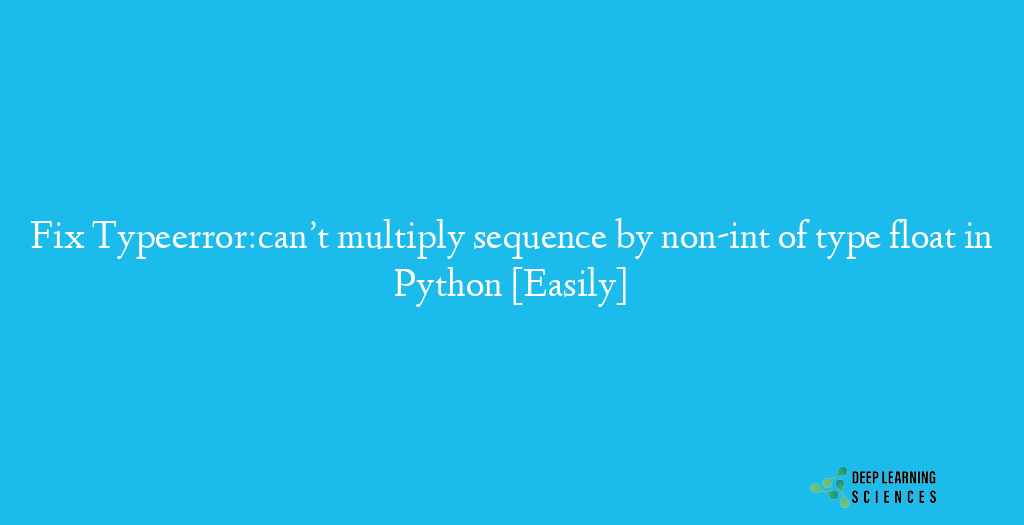The “Typeerror:Can’t Multiply Sequence by Non-Int of Type Float” error is a common issue that Python developers face. This error occurs when you try to multiply a sequence (such as a list or tuple) by a float instead of an integer. In this guide, we will explore the causes of this error and provide solutions to help you fix it.

What Causes this Error?
The “Can’t Multiply Sequence by Non-Int of Type Float” error occurs when you try to multiply a sequence by a float instead of an integer. This error is caused by a type mismatch between the sequence and the float. For example, if you have a list of numbers and you try to multiply it by 1.5, you will get this error because you can only multiply a sequence by an integer.
How to Fix Typeerror:can’t multiply sequence by non-int of type float in Python?
If you encounter the “TypeError can’t multiply sequence by non-int of type ‘float'” error in your Python code, there are several solutions to fix it. Let’s explore some of the most effective solutions below.
Using a for loop to iterate through the sequence and multiply each element by the float
One way to fix the this error is to use a for loop to iterate through the sequence and multiply each element by the float. This solution works well for small sequences and is relatively easy to implement. However, it may not be the most efficient solution for large sequences.
Here’s an example of how to implement this solution:
seq = [1.2, 3.4, 5.6, 7.8]
float_num = 2.5
result = []
for num in seq:
result.append(num * float_num)
print(result)
Output:
[3.0, 8.5, 14.0, 19.5]
Using a list comprehension to create a new list with the multiplied values
Another solution is to use a list comprehension to create a new list with the multiplied values. This solution is concise and easy to read, and it works well for both small and large sequences.
Here’s an example of how to implement this solution:
seq = [1.2, 3.4, 5.6, 7.8]
float_num = 2.5
result = [num * float_num for num in seq]
print(result)
Output:
[3.0, 8.5, 14.0, 19.5]
Converting the sequence to a numpy array and multiplying it by the float
If you’re working with large sequences, you may want to consider converting the sequence to a numpy array and multiplying it by the float. This solution is fast and efficient, and it works well for large sequences.
Also Read: Fix NameError: name ‘self’ is not defined [Easily] in Python
Here’s an example of how to implement this solution:
import numpy as np
seq = [1.2, 3.4, 5.6, 7.8]
float_num = 2.5
seq_arr = np.array(seq)
result = seq_arr * float_num
print(result)
Output:
[ 3. 8.5 14. 19.5]
Casting the float to an integer if possible
If you don’t need the precision of a float and the values in the sequence are all integers, you can cast the float to an integer to fix the error. This solution is fast and efficient, but it may not be suitable for all situations.
seq = [1, 2, 3, 4]
float_num = 2.5
result = [num * int(float_num) for num in seq]
print(result)
Output:
[2, 5, 7, 10]
FAQs
What causes the “TypeError can’t multiply sequence by non-int of type ‘float'” error in Python?
This error occurs when you try to multiply a sequence (such as a list or tuple) by a float number. Sequences can only be multiplied by integers.
What are some common scenarios that trigger the “TypeError can’t multiply sequence by non-int of type ‘float'” error?
Some common scenarios include trying to multiply a list of floats by a float number, trying to multiply a tuple of floats by a float number, or trying to use the * operator with a float number and a string.
Which solution is the best for fixing the “TypeError can’t multiply sequence by non-int of type ‘float'” error?
The best solution depends on the specific situation. Using a for loop or a list comprehension is a good choice for small sequences, while converting the sequence to a numpy array and multiplying it by the float is a good choice for large sequences. Casting the float to an integer is a good option if you don’t need the precision of a float and the values in the sequence are all integers.
Conclusion
“TypeError can’t multiply sequence by non-int of type ‘float'” error in Python can be fixed using various solutions such as for loops, list comprehensions, numpy arrays, and integer casting.